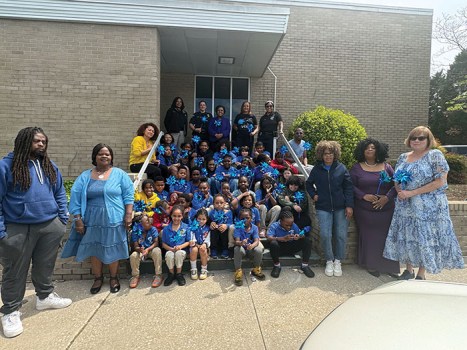It’s OK to talk: Teaching students about what to do when something bad happens
Published 12:10 am Thursday, April 17, 2025
SALISLBURY — The month of April is National Child Abuse Prevention Month, giving communities a chance to learn about the signs of child abuse and neglect, as well as develop strategies for prevention.
Part of that is making sure children of all ages know how to handle it if they see something wrong or if they are the victim of abusive behavior, as well as reminding them that they have bodily autonomy and deserve to feel safe.
Dr. Alberta McLaughlin, Salisbury Police Department’s official victim’s advocate, spent time with students at Essie Academy Tuesday afternoon to talk with them about how to handle some of those difficult moments. She brought three members of the department along with talk with students, Lieutenant Moreau and Oficers Jackson and Smith. All three are female officers in the department.
Students at Essie are from kindergarten through eighth grade, but McLaughlin took an approach they could all connect to.
She read the book “A Terrible Thing Happened” that involved a raccoon named Sherman who saw something terrible happen and how he processed it. While a book for younger children in many ways, the conversation McLaughlin led was one all the students got involved in.
She walked them through times in their own lives when they had to deal with something terrible, getting them all to acknowledge that when a person suppresses something that stresses them, it can cause headaches, stomach aches, trouble sleeping, and eventually, challenging behavior. Because the body and the brain are trying to internalize an external stress, trying to process trauma.
Traumatize was the word of the day at that point, with students at every age understanding that it can be hard, at best, to deal with trauma alone.
In the story, Sherman begins to talk with a teacher at school about the terrible thing that happened, first drawing his feelings and eventually, drawing the thing he saw. As his trust in the teacher grew, his ability to release the trauma grew with it, and as he got the trauma out of his system, his behavior changed and his own happiness and peace returned.
McLaughlin asked students if they have someone they could talk to if they have a terrible thing in their own lives. Students mentioned moms, siblings, teachers, best friends, and at last, someone said police.
McLaughlin took that moment to introduce the three officers, who continued the conversation with students about things like social media and internet safety. Some of the information they shared surprised students. A number of those in attendance didn’t realize that not only is it never a good idea to send a photo of themselves in any state of undress to someone, but to do so is actually illegal. The officers also reminded students that “no one should be asking you for photos when you are not wearing clothes. Your body is your body, and no one else has any business asking that. Just say no,” said Lt. Moreau. “And if someone wants to meet you, tell them you’ll bring your parents to meet them. If they just want you to come alone, say no.”
“And tell someone if a person is asking for photos or to meet you,” added Officer Jackson. “Because that isn’t normal.”
Students were also a little surprised to hear that a person’s digital footprint never really goes away. Police, said the officers, can find searches you have done, sites you have visited, messages you have sent, phone calls you have made, all the digital activity you have been party to long after you may think you’ve deleted it. Even SnapChat keeps things for six months, and that program is marketed as one where messages disappear immediately.
The school has been offering some sort of educational program during the month every year since its beginning in 2018, said principal Latisha Feamster.
“This type of program is always essential for our students, because they need to not only be reminded of how our world works, but they also need to know there are safe adults out there for them no matter what happens. It is a good opportunity for them to have positive interactions with police, and to learn that officers are there to help.”
McLaughlin plans to return to tutoring in the school this year, because the school holds a special place for her personally, and she said working with the students to make sure they are confident and understand their own self worth is essential.





